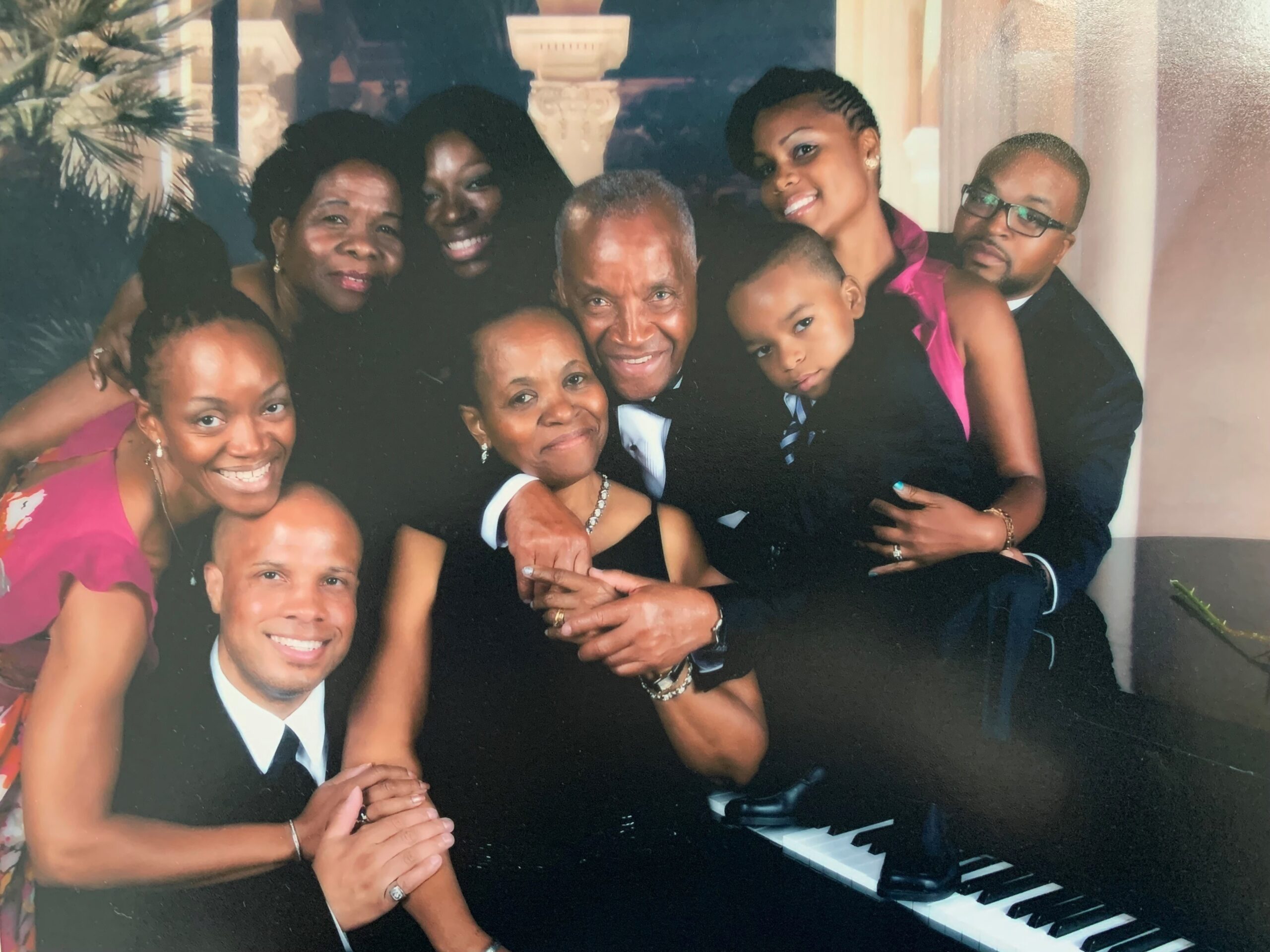
By Jasmine Smith
We often hear early diagnosis is the key to getting effective treatment and improving prognosis. But what happens when the timing of your diagnosis is out of your control? Newborn screening for both sickle cell disease and sickle cell trait is paramount for early diagnosis. Today, they are performed in all U.S. states. But once upon a time, this wasn’t a normal procedure, which has led to many sickle cell patients being diagnosed later in life.
This was the case for Dr. Marjorie Dejoie-Brewer, who learned she had sickle cell disease during her second year of medical school after the director of minority affairs mentioned that her symptoms resembled sickle cell.
“She said, ‘You know what? Your symptoms sound like sickle cell disease. We have one of the leading sickle cell pediatricians at CHOP (Children’s Hospital of Philadelphia).’ So, I attended the University of Pennsylvania Medical School – and Children’s Hospital of Philadelphia is basically on the same campus, though they’re considered two different hospitals. And because she knew pediatrician Dr. Kwaku Ohene-Frempong, she was able to give him a call and say you know ‘we have a student…these are her symptoms, it really sounds like this,’ and asked if he could do a diagnostic blood test. ,” Dr. Dejoie-Brewer recalls.
Within a couple of hours, she was finally able to put a name to something she’d been experiencing her whole life.
Although the diagnosis was late, Dr. Dejoie-Brewer describes it as right on time.
“I don’t know that finding out earlier would have changed the progression of my disease or the person that I am today. But I believe it happened when it was supposed to happen,” she adds.
The diagnosis was a shock, but Dr. Dejoie-Brewer credits the hospital staff for delivering the news with “compassion and assurance.”
“…A lot of diagnoses are given to you with an air of condolence. Usually, it’s like ‘Oh my God, I hate to tell you this but…,’” she notes.
For Dr. Dejoie-Brewer, the diagnosis was a way to finally put a finger on what was going on with her and her brother, who also has sickle cell disease and received a diagnosis around the same time.

“It wasn’t that I wasn’t going into the hospital. I had been admitted to the hospital multiple times. I would present and describe what I was experiencing, and nobody thought in all those times that I went to check for sickle cell. So, to me there was a sense of relief that came along with the diagnosis,” Dr. Dejoie-Brewer shares. “I could put a name to the illness that was causing my suffering. I wanted to go back to every single hospital and say ‘see, I wasn’t making it up. I told you something was going on.’ It is very challenging when you feel like you are not being heard and seen by doctors while experiencing the worst pain of your life…But everyone wasn’t thinking sickle cell disease at the time.”
After dealing with the shock of the diagnosis and the fear from her family, Dr. Dejoie-Brewer embarked on what she calls a
“steep learning curve” to teach herself as much information about sickle cell disease as possible.
Her diagnosis also helped change the future of the career she was preparing for in medical school.
“I went into med school just knowing I was going to go into pediatric interventional radiology — you couldn’t tell me anything else. But after my diagnosis and my experiences during medical school, I decided part of my career would be focused on sickle cell disease. I felt called to do something that’s going to help this community…So, I initially started by becoming an advocate because the medical team that diagnosed me and cared for me were very active in the community and are to this day,” she adds.
Although she shifted her career focus to sickle cell and other rare diseases, her internal medicine and rehabilitation background helped her find alternative ways to manage her disease.
“That discipline helped me develop a mindset around pairing complementary and alternative medicine with what was considered the standard of care for individuals living with sickle cell at the time. My family relied on natural remedies and healthy lifestyle choices to manage my disease and my crisis, and I have continued some of them to this day ,” Dr. Dejoie-Brewer adds.

“I have experienced a sickle cell crisis everywhere in my body except my earlobes. Developing a treatment plan that works for me continues to be a personal lifelong journey in partnership with medical providers, health care practitioners, friends and family and at times, strangers. It takes a village and I could not do it alone.”
Another critical component to managing sickle cell? Blood transfusions.
“I just got my transfusion two weeks ago, so I am very thankful for every person that gives every drop of blood that they do. Blood transfusions have become a primary part of my treatment plan for the past six years. Donors are giving individuals like me—functional cells where I am unable to produce enough functional cells,” says Dr. Dejoie-Brewer, a blood recipient who advocates for blood donations as an American Red Cross Southeastern Pennsylvania Region board member.
“Specifically in the Black community…I can’t say enough about how vital donations from our community are… [especially for] individuals who suffer from this disease…Because at the end of the day, we want to match [the blood donations with the blood of the recipients] as closely as we possibly can. So, I am thankful for every individual that takes the time out to donate,” she adds.
Advice to sickle cell warriors
From a doctor’s perspective
- Trust yourself. “Individuals with sickle cell disease know their bodies better than anyone else and are usually the experts in the room.”
- Shop around if you aren’t satisfied with your doctor. “I always tell individuals physicians are supposed to serve you. So, if the relationship is not working, shop around until you find the best fit. I know the benefits of having the right doctor and medical team, and how it can create a paradigm shift for individuals living with sickle cell disease.”
From a fellow sickle cell warrior perspective
- Tap into your resilience. “We are really resilient individuals and I truly believe in my heart that we are built in a way that we can handle the challenges that we face.”
- You’re not alone. “We’re not alone. I think sickle cell disease has been a disease where individuals feel unseen and unheard, and because of their disease process, at times live in isolation. I want to remind fellow warriors that you’re not alone and that there is a community out here that sees you, that holds space for you, and that you have a story that needs to be told.”
- Don’t limit yourself. “ At times we are told that our life is limited because of our disease process…You’re only limited by your mind. If we can manage the disease process, anything is possible. Remember: you are not your disease.”
Advice to sickle cell advocates
From a community perspective
- You may be a match. One in 3 African American blood donors are a match for people with sickle cell disease. To help ensure patients have the blood products they need, the American Red Cross is partnering with Black community organizations to host blood drives in convenient locations that help bring donation opportunities closer to home.
- Know your sickle cell trait status. For a limited time, the Red Cross is offering sickle cell trait screening on all blood donations from donors who self-identify as Black, African American, or multiracial. This additional screening will help the Red Cross identify compatible blood types more quickly to help patients with sickle cell and provide these specific donors an additional health insight.
- You can help save lives. Every two seconds, someone in the U.S. needs blood — including individuals battling sickle cell, those experiencing childbirth complications, people fighting cancer, and trauma patients in emergency rooms. Please schedule a blood donation appointment today by visiting RedCrossBlood.org/OurBlood or calling 1-800-RED CROSS.









You must be logged in to post a comment Login